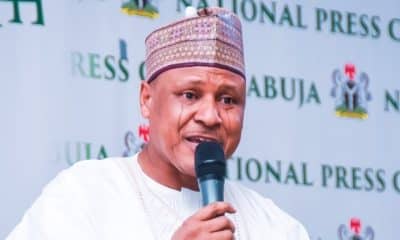Nigeria News
‘I Support Calls For Social Media Regulation’ – Lai Mohammed

A former Minister of Information and Culture, Lai Mohammed, has supported the calls for regulating social media to tackle anti-state groups, anarchists, and other ‘harmful entities’ in the country.
Naija News reports that the ex-Minister made this known at the iRepresent International Documentary Festival, part of activities to mark the 90th birthday anniversary of Nigerian Noble Laureate, Prof. Wole Soyinka, in Lagos on Friday.
The theme of the event was “Disinformation and Misinformation: The Media in the Age of Discontent”.
Mohammed clarified that his call for social media regulation was not an attempt to stifle freedom of expression or censor dissenting voices but a step toward ensuring that social media platforms were held accountable.
He said: “Let me state here that I support the calls for the regulation of social media. However, regulation of social media should not be misconstrued as an attempt to stifle freedom of expression or censor dissenting voices.
“Rather, it should be viewed as a necessary step to ensure that these platforms operate in a manner that is responsible, ethical, and conducive to the well-being of society.”
Speaking further, Mohammed noted that social media remained a major space for the proliferation of fake news, stressing that the consequences of disinformation and misinformation were far-reaching, including undermining democratic processes.
He further urged the current administration to take action against social media companies that allow misleading information to circulate unchecked.
According to Mohammed, the unchecked spread of fake news and hate speech on social media has become a severe threat to national security, with anti-state groups using these platforms to spread propaganda and incite public unrest.
He added, “Social media remains the platform of choice for the purveyors of fake news, anti-state groups, anarchists, secessionists, terrorists and bandits. It’s either on Facebook, Instagram, X, etc. With a smartphone and data, people can broadcast whatever they want with ease.
“Similarly, through technology and inventions, the challenge has even become exponential through the use of Artificial Intelligence and deep learning techniques to create highly realistic fake or manipulated videos, audio recordings or images.
“These creations often involve superimposing existing images or videos onto other contents, making it appear as though individuals are saying or doing things they never did. This is era of deepfake!
“There is no doubt that the proliferation of digital media platforms has transformed the landscape of information dissemination the world over. While these platforms have democratized access to information, they have also provided fertile ground for the spread of falsehoods and manipulation. The rapid circulation of misinformation, fueled by algorithms designed to maximize engagement, has led to a crisis of trust in traditional media institutions.
“The consequences of disinformation and misinformation are far-reaching. They undermine democratic processes, sow discord within communities, and pose significant threats to public health and safety. False narratives surrounding elections can trigger legitimacy problems for the winner.
“There were conspiracy theories fueling vaccine hesitancy as witnessed during the COVID 19 pandemic among other consequences of fake news. The impact of misinformation can be devastating, exacerbating existing fault-lines and hindering collective action.”






